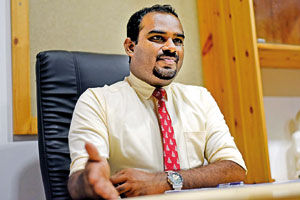View(s):
By Kasun Warakapitiya
Medicine shortages continue to badly affect health care at state run hospitals with the Government Medical Officers Association (GMOA) at loggerheads with the government.
The government insists that the best possible solutions are being provided to address the long-standing issue, but the GMOA disagrees.

Dr. Chamil Wijesinghe. Pic by Akila Jayawardena
The GMOA told the Sunday Times that the issues have not been fully resolved as medicine and medical equipment availability remains periodic, while it should be consistent.
They blamed the lack of coordination among state medicine regulatory bodies and other institutes as the major contributor to the drug shortage, while noting that emergency purchases were only a temporary solution.
However, the Deputy Minister of Health and Mass Media, Dr. Hansaka Wijemuni told the Sunday Times that the ministry has already started addressing the issue and reduced the shortage of drugs.
Drugs needed for 2026 are being purchased along with those in short supply since 2022.
The GMOA blamed the lack of coordination between the National Medicine Regulatory Authority, State Pharmaceuticals Corporation, State Pharmaceuticals Manufacturing Corporation, and medical supplies division.
Malpractices make the situation worse.
GMOA spokesman, Dr. Chamil Wijesinghe said hospitals, private dispensaries and pharmacies are facing a shortage of drugs.
Drugs and medical equipment should be available when needed, he said, in the needed quantities.
Dr. Wijesinghe said some lifesaving drugs for cancer, for respiratory ailments, cardiovascular issues, non-communicable diseases, neuro medication, painkillers and antibiotics are in short supply.
Apart from that, orthopaedic surgical equipment, and wound dressings too, are in short supply.
“The shortage has affected all hospitals both private and state. A medicine unavailable in one hospital may be available in another however, that hospital too, would not have another drug,’’ he said.
Medical sources said that though there is a digitalised system (Swastha) where it records the requirements, there is a shortage of drugs. There is no coordination among the bodies involved in regulating and maintaining medicine availability.
While the shortages persisted the hospitals were forced to either get the medicine from outside, ask the patients to purchase medicine or use substitutes which causes minimal risks and side effects.
Some medical practitioners also expressed fear of taking risks to save lives, as substitute medicines could have side effects, cause allergic reactions, or delay the desired effects.
Sources explained that a drug is considered good due to its efficacy, availability and safety. So, regulators are mainly responsible
for quality.
They said that when authorities allow a shortage to persist, the government and ministry are pushed to make emergency purchases at high cost. Funds are misused on low quality drugs.
A medical expert who requested anonymity said that the lowest quality drug could not be considered the best drug and argued that the quality and efficacy is important. Companies with universally known brand names have funding for research and try to maintain their quality and such products too should be considered.
Deputy Minister Wijemuni that while the shortage was reduced, there is still a shortage of some drugs.
He reasoned that the drug shortage was persisting even now because in 2022, 2023 and 2024 purchases were not fully completed.
According to him during the economic crisis medicine purchases were halted and order placing procedures were changed because of a lack of forex.
However the doctor assured that the ministry is involved in a government to government purchasing scheme to maintain a buffer stock. The government had purchased 50% of the drugs for 2026,
he said.
“Nearly Rs 40 billion was spent on medicine purchases in 2024, yet this year we have spent Rs 130 billion as we are purchasing medicines which were out of stock in the past years as well as for the next year,’’ he said.
The Cabinet this week approved three separate proposals for purchase of syringes, vials, injections, and medical equipment. Among these were over one million syringes of 10,000 Enoxaparin sodium injections.
The best way to say that you found the home of your dreams is by finding it on Hitad.lk. We have listings for apartments for sale or rent in Sri Lanka, no matter what locale you’re looking for! Whether you live in Colombo, Galle, Kandy, Matara, Jaffna and more – we’ve got them all!